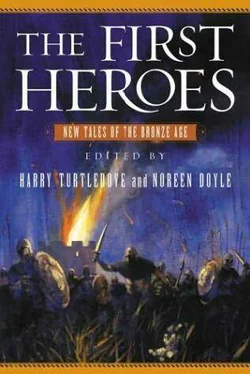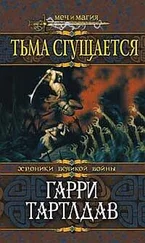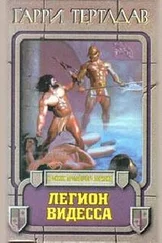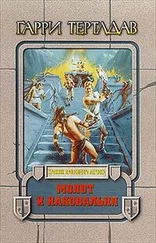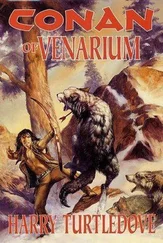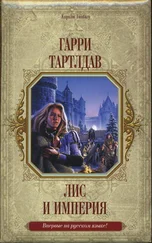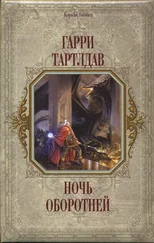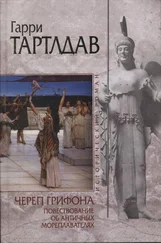Гарри Тертлдав - The First Heroes
Здесь есть возможность читать онлайн «Гарри Тертлдав - The First Heroes» весь текст электронной книги совершенно бесплатно (целиком полную версию без сокращений). В некоторых случаях можно слушать аудио, скачать через торрент в формате fb2 и присутствует краткое содержание. Жанр: Фантастика и фэнтези, на английском языке. Описание произведения, (предисловие) а так же отзывы посетителей доступны на портале библиотеки ЛибКат.
- Название:The First Heroes
- Автор:
- Жанр:
- Год:неизвестен
- ISBN:нет данных
- Рейтинг книги:3 / 5. Голосов: 1
-
Избранное:Добавить в избранное
- Отзывы:
-
Ваша оценка:
- 60
- 1
- 2
- 3
- 4
- 5
The First Heroes: краткое содержание, описание и аннотация
Предлагаем к чтению аннотацию, описание, краткое содержание или предисловие (зависит от того, что написал сам автор книги «The First Heroes»). Если вы не нашли необходимую информацию о книге — напишите в комментариях, мы постараемся отыскать её.
The First Heroes — читать онлайн бесплатно полную книгу (весь текст) целиком
Ниже представлен текст книги, разбитый по страницам. Система сохранения места последней прочитанной страницы, позволяет с удобством читать онлайн бесплатно книгу «The First Heroes», без необходимости каждый раз заново искать на чём Вы остановились. Поставьте закладку, и сможете в любой момент перейти на страницу, на которой закончили чтение.
Интервал:
Закладка:
Lawinia's words dissolve into one long sob. She tips her head back further and stares up at the gleaming dome of the sky. "Yes, of course," she says at last. "I'll accept whatever the god decides." "Good. Now get up. I hear horses coming." They walk to the head of the seaward path. Far below, horsemen are heading their way on the hard damp sand at the edge of the foaming water. Two young men ride in front, their purple boots dangling under their horses' sleek bellies. Directly after comes a man driving a two-horse chariot, a young man with slicked-back dark hair. Over a fine white tunic he wears a purple cloak carelessly slung from one shoulder. Four more horsemen, one leading a laden pack horse, ride after him. All of them carry long swords in sheaths slung from baldrics across their chests. The charioteer has a pair of spears as well, standing upright next to him in the vehicle. The bronze buckles and chapes, the bronze spear points, all glitter in the sunlight. Lawinia sobs once.
"There they are, then," Watis says.
Lawinia nods, staring down at the beach. The horsemen are coming to a stop and dismounting. The man with the purple cloak steps out of the chariot and tosses the reins to one of his men. He lays a hand on the hilt of his sword and looks up the path toward the two women.
"We'll receive them in the shrine," Watis says. "Come along."
When they go inside they leave the door open. Watis stands in front of the altar. Lawinia sits at her feet. Together they listen to the sound of footsteps trudging up the hill. "Holy one! Servant of Dian!" The man's voice bristles with anger. "Are you in there?" "Come in and see," Watis calls back. "But watch your words in the god's house." Flipping back his purple cloak, the young man strides in, and two of his men follow. Askanios. She remembers him as a child on the edge of manhood. Now stubble darkens his chin, and he stands tall.
"Give me that woman," Askanios says. "She's a murderess."
"Oh?" Watis crosses her arms over her chest. "She says otherwise."
Askanios lays a hand on his sword hilt and takes one step forward, but at that moment the sunlight reaches the west-facing window. Like a spear a long gleam falls across his eyes and blinds him. Blinking he turns sharply away. One of his men, a solid-looking fellow with gray in his hair, catches his arm and whispers urgently in their peculiar language.
"My apologies, Holy One," Askanios says. "I forgot myself."
"I'm glad you remember yourself now. Now. You say this woman murdered your father. She denies it. She tells me that she'll abide by the god's decision in the matter. Will you?" "Yes, I will. If the god tells us that she killed my father, will you give her to me?" Lawinia sobs once. "Yes," Watis says. "If the god tells me. Not if you tell me, mind. Come with me into the cave. We'll see if Great Dian will speak to us."
The mouth of the cave is a narrow opening in the mountain above the shrine. "Go up," Watis says to Lawinia. "The rest of us will follow." Then, to Askanios, "The caves are dark. If you want light, you must bring it with you."
If Askanios takes any deeper meaning from the words, he gives no sign. "Light a torch," he says to one of his men, and it is done. The flame is pale against the daylight, but when the little procession—Lawinia, Watis, Askanios and his torchbearer, and a straggling tail of armed men—passes into the depths beyond the mouth of the cave, the smoky orange glow pushes back the darkness ahead of them. The cramped entryway widens out into a large open area—the god's grotto, where his voice speaks truth through his servant to those who come willing to hear. The air is cool, freshened day and night by the breezes that issue, l ike the breath from a hundred mouths, out of the cracks and channels and narrow passageways that lead from the grotto to the world outside.
Watis seats herself on the tall chair where she will wait for the coming of the god. "Speak," she says to Askanios. "The god will listen."
"I always knew that the woman Lawinia held some grievance against my father," Askanios says. He speaks formally and in measured words, as men will speak before their gods. "I saw it in her face and heard it in her voice, though she never spoke it. What grudge she could possibly hold against the husband who had saved her from marriage to Turnus— a man whose very allies thought him a brute and a danger!—and made her part of his own high destiny, I cannot say, but a grudge there was, and it broke forth at last in anger. I was not there to hear it, but the women of the household say that she and my father quarreled over the morning meal, and that my stepmother ran from the house alone. My father went after her; and I, a newcomer to their troubles, followed too late and too far behind.
"I saw her standing on the high cliff above the sandy beach, with her hands upraised and her hair unbound, and I heard her voice rise and fall as she called out to the wind. My father was on the narrow path below, toiling upward to reach her—and when my stepmother's chant ended he fell as if struck by a javelin, toppling down from the path to his death below. He was a good man, faithful to his gods and to his duty, and this woman has worked his ending by witchcraft."
Watis does not like Askanios—he is arrogant, and he lacks the respect that should be paid to one through whom the god speaks—but she hears the faint hoarseness in his voice that tells of grief, and the god whispers to her that he has told his part of the story honestly.
"Well," she says to Lawinia, who is pale and set-faced now, and no longer crying at all. "You've heard what the son of Aeneas has to say. Now let the god hear your side of it." Lawinia faces Askanios to look him over with narrow eyes. Askanios looks back at her with lips shut hard, and his hand never leaves the hilt of his sword.
"My life has been nothing but a length of thread spun by the Fates to hold omens like beads," Lawinia begins. "My husband complained constantly of the Fates. They had driven him over the seas, he told me, and goaded him with plague and shipwreck. They had stripped him of everything he had ever loved, all for some destiny that he would not live to see. Never once did he think that I too might have a destiny, because he saw me only as the gods' assurance that he had finally accomplished his own. I knew better."
Askanios steps forward, his lips parted, but Watis raises a hand. "Be silent and listen to her," she says. "The god will decide when he's heard enough."
"Very well." Askanios steps back with a bob of his head. "Never would I cross the god's wishes."
Watis turns to the girl. "No one will interrupt you again."
And so Lawinia speaks:
I will tell you how I first heard the Fates speak to me. They came not in a dream or vision. They spoke in a borrowed voice, but I heard the message between and behind the words, even though the speaker was full of malice.
I was still a child. We lived then in the compound of the Woodpecker clan, which stood on a low hill, a mere swelling in the earth like a breast, not far from the banks of Father Tiber. Our house sprawled at the crest of the hill, because my father, Latinus, was clan chief. On a hot summer's day my mother, Amata, and her two slave women had taken their spinning out to the courtyard. In the shade of an olive tree they perched on high stools, their laps full of carded wool which they fed to the drop spindles a bit at a time. Our house bounded the court on three sides, but the fourth lay open; I was sitting on the ground nearby and playing with my wooden doll when I heard horses coming.
I looked up to see a man and a boy, or so I thought them, leading their mounts into the court. Another look, and I saw that the boy was no boy at all, but a girl, wearing a short tunic and high-laced leather sandals. Her short black hair clustered in loose curls like a cap of hyacinth blossoms, and her skin was sun-brown as new-baked bread. This was Camilla as I first saw her, her own childhood not far behind her and her name not yet known outside the circle of her kin.
Читать дальшеИнтервал:
Закладка:
Похожие книги на «The First Heroes»
Представляем Вашему вниманию похожие книги на «The First Heroes» списком для выбора. Мы отобрали схожую по названию и смыслу литературу в надежде предоставить читателям больше вариантов отыскать новые, интересные, ещё непрочитанные произведения.
Обсуждение, отзывы о книге «The First Heroes» и просто собственные мнения читателей. Оставьте ваши комментарии, напишите, что Вы думаете о произведении, его смысле или главных героях. Укажите что конкретно понравилось, а что нет, и почему Вы так считаете.
